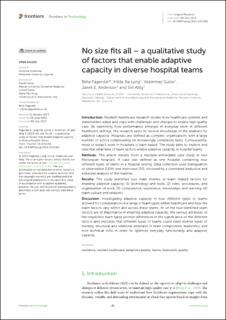| dc.contributor.author | Fagerdal, Birte | |
| dc.contributor.author | Lyng, Hilda Bø | |
| dc.contributor.author | Guise, Veslemøy | |
| dc.contributor.author | Anderson, Janet | |
| dc.contributor.author | Wiig, Siri | |
| dc.date.accessioned | 2023-11-14T14:11:15Z | |
| dc.date.available | 2023-11-14T14:11:15Z | |
| dc.date.created | 2023-09-19T15:24:22Z | |
| dc.date.issued | 2023-07 | |
| dc.identifier.citation | Fagerdal, B., Lyng, H.B., Guise, V., Anderson, J. & Wiig, S. (2023) No size fits all – a qualitative study of factors that enable adaptive capacity in diverse hospital teams. Frontiers in Psychology, 14 | en_US |
| dc.identifier.issn | 1664-1078 | |
| dc.identifier.uri | https://hdl.handle.net/11250/3102542 | |
| dc.description.abstract | Introduction: Resilient healthcare research studies how healthcare systems and stakeholders adapt and cope with challenges and changes to enable high quality care. By examining how performance emerges in everyday work in different healthcare settings, the research seeks to receive knowledge of the enablers for adaptive capacity. Hospitals are defined as complex organizations with a large number of actors collaborating on increasingly complexity tasks. Consequently, most of today’s work in hospitals is team based. The study aims to explore and describe what kind of team factors enable adaptive capacity in hospital teams.
Methods: The article reports from a multiple embedded case study in two Norwegian hospitals. A case was defined as one hospital containing four different types of teams in a hospital setting. Data collection used triangulation of observation (115 h) and interviews (30), followed by a combined deductive and inductive analysis of the material.
Results: The study identified four main themes of team related factors for enabling adaptive capacity; (1) technology and tools, (2) roles, procedures, and organization of work, (3) competence, experience, knowledge, and learning, (4) team culture and relations.
Discussion: Investigating adaptive capacity in four different types of teams allowed for consideration of a range of team types within healthcare and how the team factors vary within and across these teams. All of the four identified team factors are of importance in enabling adaptive capacity, the various attributes of the respective team types prompt differences in the significance of the different factors and indicates that different types of teams could need diverse types of training, structural and relational emphasis in team composition, leadership, and non-technical skills in order to optimize everyday functionality and adaptive capacity. | en_US |
| dc.language.iso | eng | en_US |
| dc.publisher | Frontiers Media S.A | en_US |
| dc.rights | Navngivelse 4.0 Internasjonal | * |
| dc.rights.uri | http://creativecommons.org/licenses/by/4.0/deed.no | * |
| dc.subject | sykehus | en_US |
| dc.title | No size fits all – a qualitative study of factors that enable adaptive capacity in diverse hospital teams | en_US |
| dc.type | Peer reviewed | en_US |
| dc.type | Journal article | en_US |
| dc.description.version | publishedVersion | en_US |
| dc.rights.holder | © 2023 The Author(s). | en_US |
| dc.subject.nsi | VDP::Medisinske Fag: 700::Helsefag: 800 | en_US |
| dc.source.pagenumber | 0 | en_US |
| dc.source.volume | 14 | en_US |
| dc.source.journal | Frontiers in Psychology | en_US |
| dc.identifier.doi | 10.3389/fpsyg.2023.1142286 | |
| dc.identifier.cristin | 2176648 | |
| cristin.ispublished | true | |
| cristin.fulltext | original | |
| cristin.qualitycode | 1 | |

